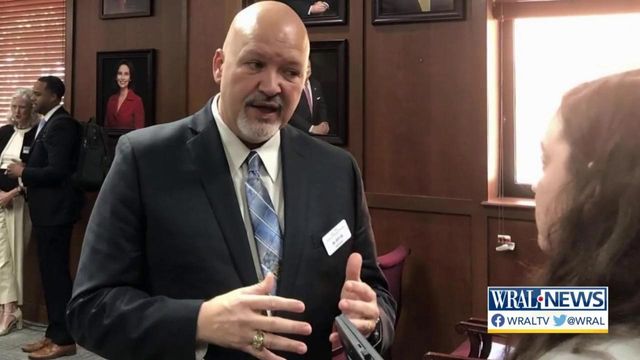'A leader among his peers': Jeff Cox takes helm at NC community college system
The new leader of the state's community colleges, Dr. Jeff Cox, made his first public appearance in his new role Monday, pledging to bring stability and innovation to the 58-campus system.
Posted — UpdatedAt a Monday news conference in Raleigh, board chairman Burr Sullivan introduced him as "a leader among his peers."
Sullivan and Cox were joined by a bipartisan group of state leaders, including Gov. Roy Cooper, Department of Public Instruction Superintendent Catherine Truitt, and Economic Development Partnership of North Carolina Chairman Chris Chung, as well as Rep. Jeff Elmore, R-Wilkes.
Cox replaces Bill Carver, who has served as interim since July, when Thomas Stith resigned from the role following an 18-month tenure.
Turnover in the top role — Cox will be the eighth president in eight years, including interim leaders — has concerned state lawmakers, who are seeking more power over the hiring decision and other changes that would give the General Assembly more oversight. Republican lawmakers pushing that shift have also expressed concern with some campus presidents, saying that some don’t work well enough with businesses to set up job-training programs.
Touting the state's recent bipartisan success in attracting new jobs, Cooper, a Democrat, said the state needs a seamless system connecting K-12 and the community college and university system. He praised the board's choice of Cox, who last week Cox said he wants to make sure community colleges are better working with area businesses to prepare students to work for them.
"The top three things CEOs are interested in these days are workforce, workforce, and workforce," Cooper said. "It's more important than ever for our community colleges to adapt to these new kinds of jobs we've created."
Superintendent Truitt, a Republican, also praised the board's pick, calling Cox "the right choice." EDPNC Chair Chung agreed.
Cox, an Allegheny County native, has been in the educational system for more than 30 years, as a teacher, a principal, a school superintendent and a community college president. He said it sends a positive message to the system to choose a North Carolinian to lead it.
Cox said a robust community college system is the key to matching the needs of workers and employers.
"Across the Southeast and in North Carolina, if you're born poor, there's a two out of three chance you're going to stay poor," Cox said. "I think our community colleges are at the very heart of changing that statistic.
"How do we change that to a two out of three chance of climbing out of poverty? That needs to be this state's legacy."
Cox thanked the board for the opportunity and pledged to bring stability and innovation to the system.
"We have to be willing to think differently," Cox said. "We find people where they are and take them as far as they go."
Asked about his first priorities, Cox said filling crucial positions and building relationships with partners.
"The target right out of the gate is business and industry," Cox said. "Every single business and industry in this state has a community college no more than 30 minutes away that they could be partnering with."
Republican lawmakers are working on a bill to require legislative confirmation of the president’s position, which would give GOP leadership more power over who becomes president of the system, which provides certificates and two-year degrees, adult education and GED programming.
That bill would also overhaul the board and increase the system president’s power over the 58-campus system, in part by giving the system president the power to fire local campus presidents in the system and taking power away from the governor and local school leaders at the state and campus level. The measure, Senate Bill 692, is part of a suite of bills shifting appointments to consolidate more power with the General Assembly and thus its political majority.
Cox declined to specifically address the Senate's proposal to change the system's governance structure, but said, "There's opportunity for a lot of discussion" with lawmakers and system leaders.
In Wilkes County, Cox said he'd been able to raise more than $20 million in local philanthropic support for scholarships, career coaches, and other changes needed to improve outcomes for students.
Asked about state funding, Cox praised what lawmakers have done so far to help fill difficult positions, but acknowledged, "It is going to require investing at a higher level. We have to have that open and honest conversation."
"We have to be willing to re-look at our whole funding formula. I think there are some tweaks we can make," Cox said. We've got businesses, companies that are willing to invest in some of that really expensive equipment if they know it's going to be used to train the employees they'll be getting."
Related Topics
• Credits
Copyright 2024 by Capitol Broadcasting Company. All rights reserved. This material may not be published, broadcast, rewritten or redistributed.






